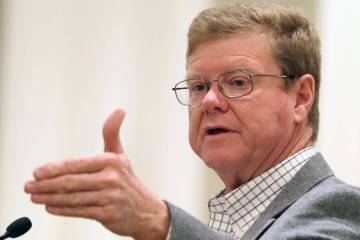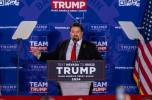Some in Nevada Legislature want popular vote to determine presidency
CARSON CITY — A bipartisan proposal to elect the president based on the popular vote from all 50 states and Washington, D.C., was debated Tuesday in an Assembly Committee.
Assembly Bill 274, introduced by Assemblyman Nelson Araujo, D-Las Vegas, would have Nevada follow the lead of 11 other states that have enacted the “Agreement Among the States to Elect the President by National Popular Vote.”
The bill would make the electors identified with the president and vice president who win the national popular vote the official presidential electors for each state. It was heard by the Assembly Legislative Operations and Elections Committee but no immediate action was taken on the measure.
BEYOND BATTLEGROUND
Saul Anuzis, a senior adviser to National Popular Vote and a former chairman of the Michigan Republican Party, said enacting the compact would make every vote matter beyond “battleground” states like Nevada.
“Wouldn’t it make more sense to have a system where voters in every state, during every election, are relevant?” he asked. “We would be forced to build stronger state parties, run national campaigns and make sure our state resources fund efforts in our stats — not the privileged few battleground states every four years.”
Anuzis said the process is constitutional, logical and legal.
Assemblyman Ira Hansen, R-Sparks, said the advocates make a compelling case. But from a selfish standpoint, Nevada saw $55 million in political spending in the last election cycle because of its battleground status, he said.
Anuzis said Nevada’s status could change as has occurred in other states and so might not be a focus of the presidential candidates in future cycles.
Making every vote count is a long-term benefit of the proposal, he said.
ELECTORAL COLLEGE REMAINS
The compact would preserve the electoral college, but it would eliminate the winner-take-all rule for awarding the votes in most states. The rule has allowed five of the country’s 45 presidents to come into office without having won the most popular votes nationwide.
The most recent example was the 2016 presidential election, when Republican Donald Trump won enough electoral votes to become president, but Democrat Hillary Clinton won the popular vote.
The interstate compact would take effect only when enacted by states possessing a majority of the electoral votes, 270 of 538. Eleven jurisdictions, representing 165 electoral votes, have approved the compact.
The measure drew support from the Nevada League of Women Voters and other speakers.
“We oppose the Electoral College system and argue that it has outlived its usefulness,” said Sondra Cosgrove, chairwoman of the League of Women Voters of Nevada Legislative Advocacy Committee.
The state Republican Party voted to oppose the bill, and some opponents say a change would give too much power to populous states like California and Florida.
Contact Sean Whaley at swhaley@reviewjournal.com or 775-461-3820. Follow @seanw801 on Twitter.
Changing the vote
The National Popular Vote bill has been enacted into law by 11 jurisdictions including four small jurisdictions (Rhode Island, Vermont, Hawaii, and the District of Columbia,), three medium-size states (Maryland, Massachusetts, and Washington), and four big states (New Jersey, Illinois, New York, and California).
The 11 jurisdictions that have enacted the bill possess 165 electoral votes. The National Popular Vote compact will come into effect when approved by state possessing 270 electoral votes. Thus, 105 more electoral votes are needed. Nevada has six electoral votes.




























